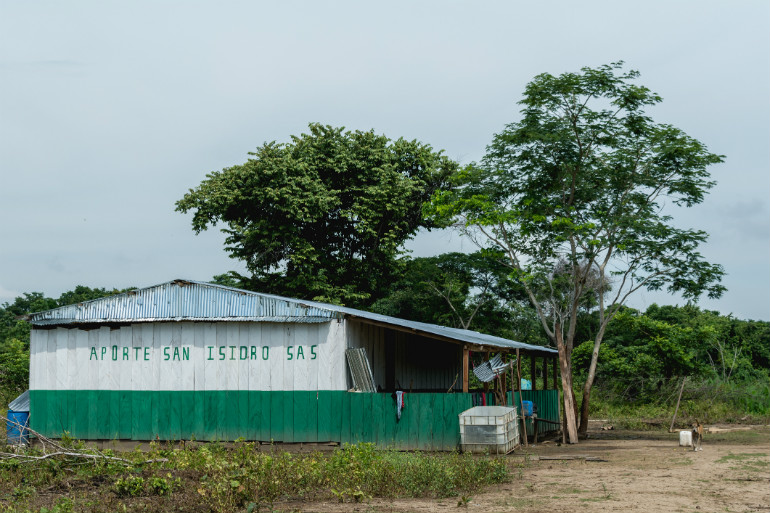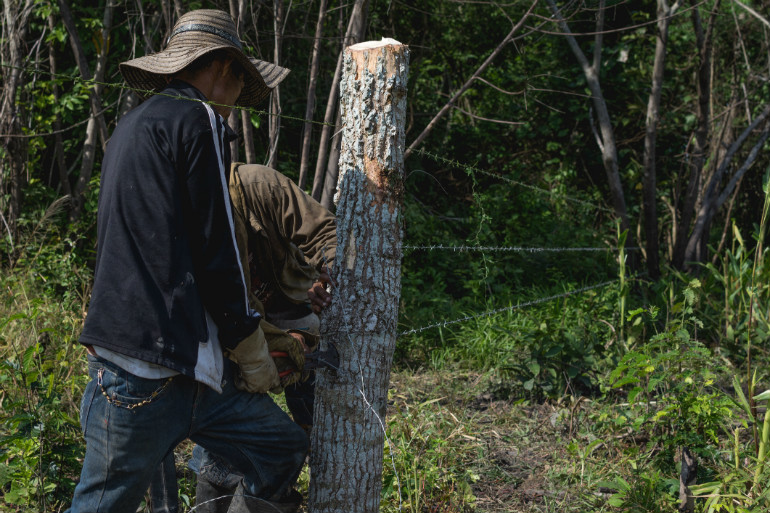CPTnet
8 November 2014
COLOMBIA: Las Pavas questions collective reparation program. Will Santos government stand up for Las Pavas?
[Note: This release has been adapted for CPTnet. The original is available here.]
 |
On Wednesday, 17 September the Victims Unit (Unidad de
Victimas) and the Colombian Institute for Rural Development (INCODER) visited
the Las Pavas community to move the Collective Reparation process forward. They also investigated violations that
the Aportes San Isidro (ASI) palm oil company has committed against the
community. The first was the reinstallation of a gate that prevents Las
Pavas community members from traveling on the main road to their farms, forcing
them to take a difficult detour through the jungle. The second was the construction of a house and resettlement
of a family on Las Pavas’ land. The latter is an illegal invasion of
state land.
The Collective Reparation process is a government program
offered to communities or organizations as part of its efforts to compensate
victims of the civil war. The Las
Pavas case is high profile because they one the 2013 National Peace Prize, so
the government chose the community to be one of the first for collective
reparation. In theory, the process
is a good one where reparation involves making services available to the
community such as psychosocial care, housing, and development projects.
In October 2010, Presidente
Santos announced his Shock Plan for land restitution. He said that
for peace to be achieved there needed to be serious measures taken about land
redistribution and restitution. The Las Pavas community was named as a
priority case.
In November of 2012, INCODER declared ‘eminent domain’ on
the land of Las Pavas declaring it state land. If Aportes San Isidro had respected this order, INCODER would
then have divided the land and titled it to the families of Las Pavas. However,
powerful economic and political allies of ASI prevented the enforcement of this
declaration. Las Pavas community
members have witnessed and documented ASI employees burning down families’
homes, destroying crops, severely beating and firing shots at people, stealing
tools and killing livestock. They have done all of this with full
impunity. The local authorities
have arrested no one from the company even though they have received
reports of these crimes.
 |
| Two community members putting up a new fence to keep cattle from the new Aportes San Isidro house (above) from destroying their crops. |
Aportes San Isidro installed the gate preventing the Las
Pavas community from accessing the road to their land for the first time on the
night of 18 October 2012, the night after INCODER left when they finished their
final inspection of the land. Finally, after a year of struggling to get
the gate removed, local and national authorities had the gate removed for the
first time on 15 November 2013. After
that, the company has reinstalled the gate three times in direct violation of
the law.
On 17 September 2014 when INCODER and Victims Unit officials
went to the farm to investigate the recent violations, they encountered the
gate. Two officials of the local municipal government and four police
officers were also present. A
Victims Unit officer demanded that the officials take down the gate. Neither the police nor the municipal
official responsible for such actions wanted to act. ASI company security
officials stood close by in a threatening manner taking pictures and filming.
When the police refused to remove the gate, the Victims Unit person
called his commanding officer and told him what was happening. She then passed the phone to the police
standing beside her and after a couple of minutes he hung up and said, “I have
been ordered to open the gate.”
It took a while to find a tool but finally the police
opened the lock and swung the door open. With that, he hoped that he was
done his job but community members argued that if they did not tear down the
entire gate, the company could easily attach another lock and chain. A
chainsaw was produced and this time the local municipal official had the
responsibility to cut the gate into pieces. He was scared of doing so
because he feared legal action from the company. ASI has many lawyers and
lots of money to harass people legally, which means anyone who stands in their
way risks an expensive legal battle even if the company has no legal grounds to
stand on. The gate was finally cut
down but this took the entire afternoon. The group had planned to go to
the land to investigate the violations and then return to town to do some
workshops on the topic of Collective Reparation. Because of the delay, the visiting officials put off the
meetings until the next morning.
The following morning the community gathered and the Victims
Unit representatives led a playful activity to help the community understand
the steps of the reparation process. The mood was cheerful and the people
of Las Pavas encouraged by the idea of receiving recognition and reparation for
everything they have lost. But then one man spoke up. He is one of
few community members who has risked living out on the land side by side with
the company workers. He has to deal with a closed gate everyday and he
was one of the community members beaten. “All this talk of reparation is
nice but if the government does nothing to improve our security and guarantee
our safety it is worthless.”
Then the community’s lawyer spoke up saying, “This is
important for you to hear. You three people from the National Victims
Unit are good people and you have very good intentions with the community but
you must understand what is at risk here. It is the credibility of the
state. Everything you want to do with the community is useless—of your
efforts will be in vain—unless the community can be given guarantees that they
can live on the land without threat of having their belongings stolen or
destroyed. Or at risk of being
beaten. And the people who have
committed crimes against them be prosecuted. If one branch of the government is working to help the
community but another is helping the people who are committing crimes against
them the community will lose all trust in the government.”
Lastly, Misael Payares, a leader of Las Pavas, made clear
“that we will not accept cheap handouts. Back in the days when we could
farm without problems, I had two children studying in the city. Many of
us had cattle and motors for our canoes and other tools. If we are able
to farm we can earn a good living.”
The Las Pavas community still has hope that one day they
will farm the land. In fact they already are. Part of the Las Pavas
land lies across the river, free from attack by ASI company workers.
Several families have started farming. Don Pedro and Don Orlando
represent two of five families who are farming rice, corn, watermelon, and
squash together. “When visitors come they always focus on the bad stuff
that is happening. It is important for you to see the good,” they noted. They have a total of about three
hectares (six acres) of crops planted together. Squash and watermelon
mixed in with the corn and rice. Their smiling faces were filled with
pride as they talked about their crops. They talked about how many people
from the town will eat from these crops and then about selling the surplus,
demonstrating the strong sense of community that exists in Las Pavas.
The community became a target of the armed groups because
they were organized. For this
reason the government has decided to grant them Collective Reparation. Now the government must decide: Will it
take the community’s concerns seriously? Will it stand up for the
community and enforce its own rulings?



